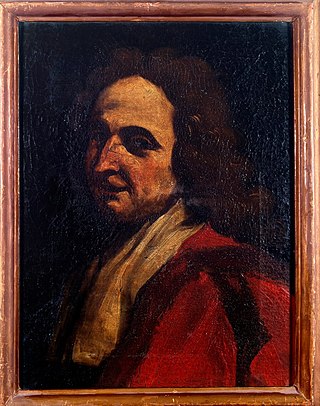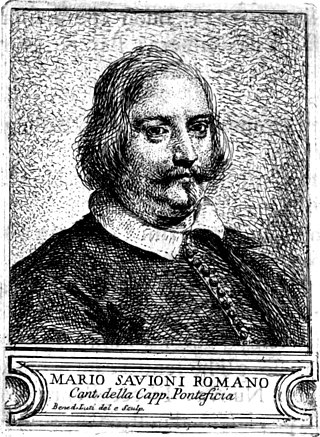Related Research Articles

A madrigal is a form of secular vocal music most typical of the Renaissance and early Baroque (1600–1750) periods, although revisited by some later European composers. The polyphonic madrigal is unaccompanied, and the number of voices varies from two to eight, but usually features three to six voices, whilst the metre of the madrigal varies between two or three tercets, followed by one or two couplets. Unlike the verse-repeating strophic forms sung to the same music, most madrigals are through-composed, featuring different music for each stanza of lyrics, whereby the composer expresses the emotions contained in each line and in single words of the poem being sung.
The year 1607 in music involved some significant events.
In music, a canzonetta is a popular Italian secular vocal composition that originated around 1560. Earlier versions were somewhat like a madrigal but lighter in style—but by the 18th century, especially as it moved outside of Italy, the term came to mean a song for voice and accompaniment, usually in a light secular style.

Stefano Landi was an Italian composer and teacher of the early Baroque Roman School. He was an influential early composer of opera, and wrote the earliest opera on a historical subject: Il Sant'Alessio (1632).

Italian opera is both the art of opera in Italy and opera in the Italian language. Opera was in Italy around the year 1600 and Italian opera has continued to play a dominant role in the history of the form until the present day. Many famous operas in Italian were written by foreign composers, including Handel, Gluck and Mozart. Works by native Italian composers of the 19th and early 20th centuries, such as Rossini, Bellini, Donizetti, Verdi and Puccini, are amongst the most famous operas ever written and today are performed in opera houses across the world.
Giovanni de Macque was a Netherlandish composer of the late Renaissance and early Baroque, who spent almost his entire life in Italy. He was one of the most famous Neapolitan composers of the late 16th century; some of his experimentation with chromaticism was likely influenced by Carlo Gesualdo, who was an associate of his.
The year 1632 in music involved some significant events.
The year 1613 in music involved some significant events.
The year 1612 in music involved some significant events.
The year 1618 in music involved some significant events.
The year 1617 in music involved some significant events.
Michelangelo Rossi (Michel Angelo del Violino) (ca. 1601/1602 – 1656) was an important Italian composer, violinist and organist of the Baroque era.

Mario Savioni was an Italian composer and a male alto of the Baroque era.
References
- ↑ Speck, Christian (2003). Das italienische Oratorium 1625-1665: Musik und Dichtung.
- ↑ Whenham, John. "Campana, Francesca" . Retrieved 18 January 2011.[ permanent dead link ]
- ↑ Tyrrell, John (2001). The new Grove dictionary of music and musicians: Volume 21.
- ↑ "Classical Composers (C-E)" . Retrieved 18 January 2011.